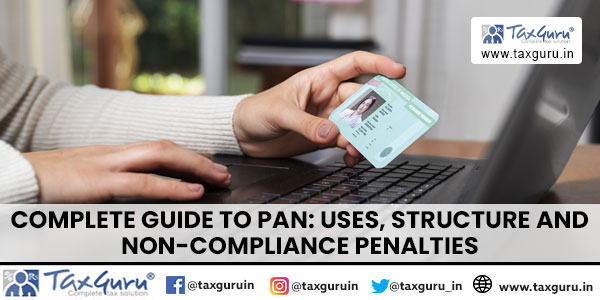The Complete Guide to PAN (Permanent Account Number): Uses, Structure, and Penalties for Non-Compliance
A PAN (Permanent Account Number) is a unique 10-character alphanumeric identifier issued by the Income Tax Department of India to individuals and entities. It serves as a means of identifying taxpayers in the country. The Income Tax Department of India introduced the PAN (Permanent Account Number) card system to track financial transactions and ensure proper taxation. This system was established in 1972 under the National Securities Depository Limited (NSDL) as part of the Income Tax Act, 1961, under Sec 139A of the Income Tax Act. The validity of PAN (Permanent Account Number) itself does not have an expiration date, meaning once it is issued, it remains valid for a lifetime. The purpose of this initiative was to create a unique identification number for taxpayers, streamlining tax-related processes and preventing tax evasion by maintaining accurate records of individuals’ financial transactions.
The structure of a PAN number is ABCDE1234F, where the first five characters are letters, the next four are numbers, and the last character is a letter.
PAN Structure:
ABCTD1234E
First 5 Characters (Letters): The first three characters are alphabetic letters. These represent a random combination. The 4th character represents the type of PAN holder. The 5th character is also an alphabetic letter.
Breakdown of Characters:
- 1st to 3rd Characters (Alphabet Letters):
These are randomly assigned alphabetic characters. They don’t have any specific meaning or relevance to the individual’s information. E.g. ABC - 4th Character (Status of the PAN Holder):
This represents the type of PAN holder. The character indicates the category of the entity to which the PAN is issued. The most common categories are:- P: Individual
- C: Company
- H: Hindu Undivided Family (HUF)
- A: Association of Persons (AOP)
- B: Body of Individuals (BOI)
- F: Firm
- T: Trust
E.g. If the 4th letter is T, it means the PAN is issued to a Trust.
- 5th Character (Alphabet Letter):
The 5th character is another random alphabetic letter that has no specific significance. - 6th to 9th Characters (Numeric Digits):
These are 4 digits that are randomly assigned to the PAN holder. These digits serve as a unique identifier. E.g. 1234 (could be any combination of numbers). - 10th Character (Alphabet Letter):
The 10th character is an alphabetic letter that acts as a check code. It helps validate the PAN. It is based on an algorithm derived from the previous characters to prevent fraud or duplication.
The Income Tax Department (ITD) issues three types of PAN cards based on the applicant’s category. These types are:
1. Individual PAN
- Issued to individuals, including Indian citizens, NRIs (Non-Resident Indians), foreign nationals, and HUFs (Hindu Undivided Families). Primarily used by individuals for filing income tax returns, opening bank accounts, and other financial and tax-related transactions.
2. Corporate PAN
- Issued to companies (whether private or public), partnership firms, and other types of business entities. Used by organizations for tax filing, managing financial transactions, and compliance with tax laws.
3. e-PAN
- It is a digital version of the PAN card. It serves as an official document and is issued in electronic form to the applicant. The e-PAN is valid for all purposes just like the physical PAN card.

Why Your PAN is Important in Everyday Transactions?
A Permanent Account Number (PAN) has a wide range of uses, primarily related to taxation and financial transactions. Here are the key uses of PAN:
1. Opening a Bank Account:
- When you decide to open a savings or current account at a bank, your PAN is essential. It helps the bank confirm who you are, following the Know Your Customer (KYC) rules. So, if you’re visiting a big bank like SBI or HDFC, don’t forget to bring your PAN card along!
2. Filing Your Income Tax Return:
- Your Permanent Account Number (PAN) is like a key to filing your income tax returns (ITR) and paying the taxes to the government. Whether you’re an individual or running a business, having a PAN helps you keep track of your tax payments and deductions. It’s also linked to Tax Deducted at Source (TDS) and Tax Collected at Source (TCS), making it easier for you to know what’s been deducted from your salary or other income. Plus, if you’ve paid too much tax, your PAN is needed to get your refund back!
3. Receiving Your Salary or Pension:
- If you have a job, your employer will ask for your PAN to make sure they deduct the right amount of TDS from your salary. This helps keep your tax records straight. E.g. if you work at Reliance Ltd. and earn ₹1,00,000 a month, your PAN will help ensure the correct tax is deducted from your pay.
4. Applying for a Loan:
- Need a personal loan, home loan, or auto loan? Your PAN will be part of the paperwork you need to submit. Lenders use it to evaluate your credit history and ensure you’re compliant with tax regulations. E.g. when you apply for a home loan with HDFC, they’ll want your PAN to check if you qualify.
5. For GST Registration:
- If you’re starting a business and need to register for Goods and Services Tax (GST), your PAN will be a must-have for getting your GST Identification Number (GSTIN). This helps the tax authorities keep track of payments and ensure everything is compliant. E.g. if you launch a small retail shop, don’t forget to get your PAN ready for GST registration!
6. Investing in Stocks and Mutual Funds:
- You’ll need your PAN to open a Demat account. It keeps everything organized so that tax liabilities and capital gains are tracked properly. The same goes for mutual funds—your PAN is required to make sure all your transactions are in order. When you’re ready to trade on platforms like Zerodha or Upstox, keep your PAN handy!
7. Buying High-Value Items:
- Planning to buy something big, like a house or a luxury car? If the purchase exceeds ₹50,000, you’ll need to provide your PAN. E.g. when buying a flat worth ₹60 lakh or gold jewelry worth ₹1 lakh, the seller will ask for your PAN to report the transaction for tax purposes. This also applies to cars and other high-value goods!
8. Receiving Gifts or Donations:
- If you receive a gift that’s worth more than ₹50,000 in a year, the giver might need to share their PAN. However, gifts from close relatives typically don’t require this. If you donate over ₹2,000 to a charity, you’ll also need to provide your PAN to claim tax deductions. E.g. if you receive a substantial gift from a relative, they will need your PAN to document the transaction properly.
9. For Foreign Nationals and Businesses:
- If you’re a foreign national or have a business in India, having a PAN is crucial. It helps you meet tax obligations for income earned in India and is required for things like opening a bank account here or investing in the local market. In short, it helps you stay on the right side of Indian tax laws!
10. Making Payments for Foreign Travel:
- Planning an international trip? If you’re exchanging more than ₹50,000 for travel, your PAN will be requested by the service provider, like currency exchange offices.
11. Investing Abroad:
- If you’re looking to invest in international markets, your PAN is necessary. It helps ensure everything is for tax purposes and for opening of Bank Account in a foreign country.
- Overall, knowing the importance of your PAN can make all these everyday financial transactions smoother and keep you compliant with tax regulations. So, keep that PAN handy—it’s a vital part of your financial toolkit!
If you fail to comply with the conditions prescribed under the Income Tax Act you will face a penalty as such:
1. Quote a false PAN Number.
2. Fails to provide a PAN Number for the prescribed transactions.
3. Fails to apply for PAN.
4. Misuse or duplicate PAN.
The penalty is ₹10,000 for each of these defaults.
Here are some examples of transactions where you mandatorily quote PAN:
1. Opening of D-Mat account.
2. Sale or purchase of motor vehicles other than two-wheelers.
3. Sale or purchase of any immovable property if SDV greater than ₹10 lakhs.
4. Cash payment of ₹50,000 or more to a hotel or restaurant against a bill at any one time.
5. Payment to a Mutual fund for purchasing its units amounting exceeding ₹50,000.
6. Sale or Purchase of Shares of any unlisted company of amount exceeding ₹1,00,000 per transaction, and many more.
The views expressed are the personal views of the author only and are for educational purposes only. There may be other views also. So, the readers are advised to consider all the points before relying upon the above write-ups.





